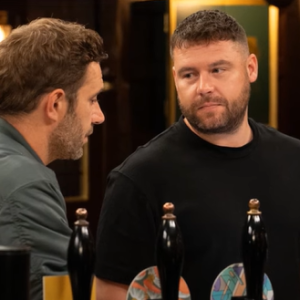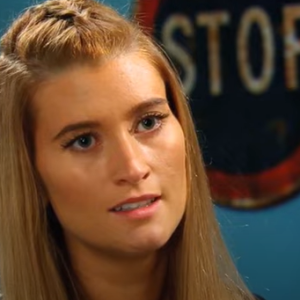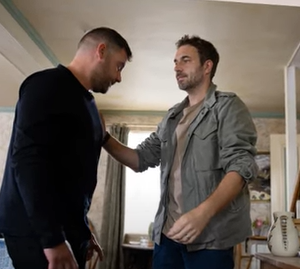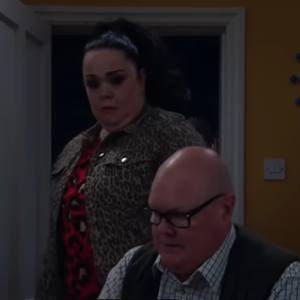Eden Taylor‑Draper has been a fixture of Emmerdale since she first toddled onto screens as little Belle Dingle in 2005, and over two decades she has matured from child actor into the beating dramatic heart of the Dales, delivering gut‑punch performances that have left viewers reeling; from storylines of teenage turmoil to guilt‑ridden secrets and, most memorably, the devastating domestic abuse at the hands of Tom King that called for a rawness and bravery few young actors can summon, Eden’s Belle has become synonymous with resilience and complexity, a character who can make a Sunday night living room pulse with dread and sympathy at once, which is why the recent clip of Eden speaking in her natural voice sent social feeds and comment sections into a tailspin, as fans struggled to reconcile the familiar face with an accent that sounds nothing like the one they’ve grown accustomed to on the soap. The dissonance felt by viewers wasn’t merely about dialect; it was the odd sensation of watching a character step off the screen and reveal an identity the scripts had never permitted — Belle’s gritty, sometimes thorny northern tones replaced by Eden’s softer, more neutral speech in the intimate, unpolished environment of TikTok, and that mismatch laid bare how much acting choices — vocal, physical and emotional — shape our attachment to fictional people until the lines between performer and persona blur almost beyond recognition.
The TikTok video itself was innocent enough: Eden sharing holiday reads and a relaxed moment with fans, a side of a public figure that modern audiences crave and that stars can curate at will, yet that casualness is what made the contrast so acute; there is a peculiar intimacy in hearing an actor’s unadorned voice, no microphone boom, no studio EQ, no character easing into place, and suddenly viewers who have spent years mourning for Belle or celebrating her hard‑won victories were stumbling over the simple revelation that the warmth and cadence they associated with the Dingle matriarch are, in fact, crafted choices — choices that highlight Eden’s skill rather than diminish it. The reaction was instantaneous and varied: some fans admitted confusion, admitting their brains refused to connect the voice to the face, others expressed delight at seeing Eden as herself, a person outside the performing box, while a smaller but vocal contingent felt briefly cheated, as though a beloved narrative safety net had been pulled away, revealing the artifice beneath. That mix of astonishment and affection illustrates the weird, modern phenomenon of parasocial relationships — viewers invest emotionally in characters to such an extent that any revelation about the actor’s off‑screen life becomes not merely trivia but an event that requires emotional processing.
That Eden’s natural accent diverges from Belle’s is not an accident but an actor’s tool deployed to fit a character into a very specific social and regional tapestry; Belle Dingle wears the accent of the village, its hard edges and inherited speech patterns, and that voice carries with it class history, local color and the accumulation of a fictional life that has seen betrayal, violence, love and stubborn survival, and Eden’s ability to inhabit that voice over decades is a testament to her craft, not a betrayal of authenticity. When fans learned Eden’s real way of speaking, the conversation shifted into territory that interrogates what we expect from actors and what we owe them as individuals: should performers always be “on” even in casual online clips? Do we have a right to be surprised, or is surprise a byproduct of the depth of our investment? Social media, with its capacity to collapse public and private personas, amplifies these questions — and Eden’s simple book chat became a case study in the modern dynamics of celebrity, authenticity and the public’s appetite for “real” moments. For many, the revelation only deepened admiration: to sustain a character like Belle for so long, especially through the character’s darkest arcs, requires a disciplined transformation, and hearing Eden’s off‑stage voice underscored the deliberate layering that makes Belle’s pain and defiance feel so immediate on screen.
But beyond the philosophical debate lies the raw, human reaction — people were simply shocked, delighted and a little disoriented, and that mix of emotion fed the viral loop; comments ranged from “I literally couldn’t place her because of the accent” to affectionate remarks welcoming Eden into a broader public identity, and the media devoured the story because it is, at root, a small drama about perception, expectation and the pleasure of being surprised. For those who have followed Belle’s journey — from juvenile misdemeanors and love affairs to the darkest days of abuse and the slow rebuilding that followed — the knowledge that the young actor behind the role speaks differently in private does not undermine the performance, but temporarily unsettles the familiar rhythms viewers use to inhabit a fictional world. The debate also nudged a tender appreciation for how acting can be an act of service: Eden’s voice on set belongs, for a while, to the character and to the story, and her willingness to give so much of herself to Belle has produced some of the soap’s most memorable moments, moments that have earned her awards and a place in viewers’ hearts. 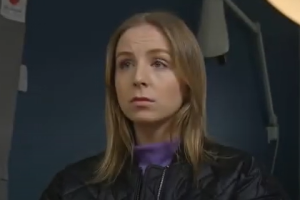
At the end of the day, the viral reaction to Eden Taylor‑Draper’s real voice is a reminder that soap operas are intimate storytelling machines that demand long‑term trust between actor and audience, and that trust often depends on an invisible compact: actors will commit to their roles and viewers will accept those roles as truth for the duration of the tale; when that compact is punctured — even gently, by a TikTok where an actress discusses novels in her everyday voice — the resulting surprise becomes newsworthy because it forces us to confront the machinery of performance. Fans will move on quickly, as they always do, but not without carrying a new appreciation for Eden’s craft and perhaps a sweeter fondness for Belle, knowing now the work that lies behind every tremor, quip and defiant stare. Whether it’s shock, bemusement or renewed admiration, the conversation sparked by that brief video has done what the best soap scenes do: it has made viewers feel, think and talk — and in the world of Emmerdale, where every accent and gesture is a clue to a life, that is drama enough.
